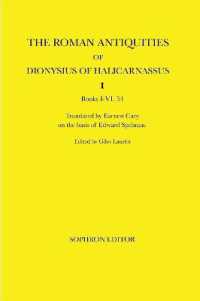Full Description
Featuring specially commissioned chapters from experts in the field of media and communications law, this book provides an authoritative survey of media law from a comparative perspective.
The handbook does not simply offer a synopsis of the state of affairs in media law jurisprudence, rather it provides a better understanding of the forces that generate media rules, norms, and standards against the background of major transformations in the way information is mediated as a result of democratization, economic development, cultural change, globalization and technological innovation.
The book addresses a range of issues including:
Media Law and Evolving Concepts of Democracy
Network neutrality and traffic management
Public Service Broadcasting in Europe
Interception of Communication and Surveillance in Russia
State secrets, leaks and the media
A variety of rule-making institutions are considered, including administrative, and judicial entities within and outside government, but also entities such as associations and corporations that generate binding rules. The book assesses the emerging role of supranational economic and political groupings as well as non-Western models, such as China and India, where cultural attitudes toward media freedoms are often very different.
Monroe E. Price is Director of the Center for Global Communication Studies at the Annenberg School for the University of Pennsylvania and Joseph and Sadie Danciger Professor of Law and Director of the Howard M. Squadron Program in Law, Media and Society at the Cardozo School of Law.
Stefaan Verhulst is Chief of Research at the Markle Foundation. Previously he was the co-founder and co-director, with Professor Monroe Price, of the Programme in Comparative Media Law and Policy (PCMLP) at Oxford University, as well as senior research fellow at the Centre for Socio Legal Studies.
Libby Morgan is the Associate Director of the Center for Global Communication Studies at the Annenberg School for the University of Pennsylvania.
Contents
Introduction, Stefaan Verhulst and Monroe Price Part 1: Media Policy and Institutional Design 1. Tracing Media Policy Decisions: Of Stakeholders, Networks and Advocacy Coalitions, Hilde Van Den Bulck 2. Rational Legal Authority, Formal and Informal Rules in the News Media, Paolo Mancini 3. Independence in Media Regulation, Thomas Gibbons 4. Mainstreaming EU cultural policies internally and externally: caught between subsidiarity and global subsidiarity?, Jan Loisen, Caroline Pauwels and Karen Donders 5. Commercial Content and its Relationship to Media Content: Commodification and Trust, Lesley Hitchens Part 2: Media Policy, Free Speech and Citizenship 6. The European Court of Human Rights, Media Freedom and Democracy, Rónán Ó Fathaigh and Dirk Voorhoof 7. The different concepts of free expression and its link with democracy, public sphere and other concepts, Joan Barata Mir 8. Internet Freedom, the Public Sphere and Constitutional Guarantees: a European Perspective, Bernd Holznagel 9. Freedom of Expression and the Right of Access to the Internet: A New Fundamental Right?, Nicola Lucchi 10. From Freedom of Speech to the Right to Communicate, Daithí Mac Síthigh 11. Public Service Media Narratives, Ellen Goodman 12. Accountability, Citizenship and Public Media, Richard Collins Part 3: Media Policy and Comparative Perspectives 13. Customary Law and Media Regulation in Conflict and Post-Conflict States, Nicole Stremlau 14. In the Name of God: Faith-based Internet Censorship in Majority Muslim Countries, Helmi Noman 15. Media Control with Chinese Characteristics, Rogier Creemers 16. Social Dynamics in the Evolution of China's Internet Content Control Regime, Guobin Yang 17. Between Sedition and Seduction: Thinking Censorship in South Asia, William Mazzarella and Raminder Kaur Part 4: Media Policy and Media Governance 18. Controlling New Media (Without the Law), Mira Burri 19. Are states still important? Reflections on the nexus between national and global media and communication policy, Marc Raboy and Aysha Mawani 20. International Governance in a New Media Environment, Rolf Weber 21. Self- and Co-Regulation: Evidence, Legitimacy and Governance, Michael Latzer, Natascha Just, Florian Saurwein 22. Media Governance and Technology: From "Code is Law" to Governance Constellations, Christian Katzenbach 23. Governing Media Through Technology: The Empowerment Perspective, Antonios Broumas Part 5: Media Policy and Technological Transformation 24. Do we know a medium when we see one? New media ecology, Karol Jakubowicz 25. To 'be let alone' in social media: the market and regulation of privacy, Katharine Sarikakis and Dimitris Tsapogas 26. Self-Regulation and the Construction of Media Harms: Notes on the Battle over Digital "Privacy", Joseph Turow 27. Technological Innovation, Paradox and ICTs: Challenges for Governing Institutions, Robin Mansell 28. Net Neutrality and Audiovisual Services, Nico van Eijk 29. Network Neutrality and the Need for a Technological Turn in Internet Scholarship, Christopher Yoo








